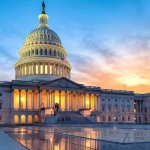NYC, New York — In a historic legal development, Donald Trump has become the first president-elect in U.S. history to be sentenced for a criminal conviction. Just days ahead of his scheduled return to the White House on January 20, state Judge Juan Merchan issued an “unconditional discharge” in the New York hush-money case. While the ruling upholds Trump’s conviction, it spares him additional penalties, including jail time.
The decision follows a closely watched 5-4 Supreme Court vote rejecting Trump’s emergency appeal to halt the case. Despite the ruling, Trump vowed to continue fighting the conviction, signaling his intent to exhaust all legal avenues.
A Conviction Rooted in Controversy
The case centers on 34 felony counts of falsifying business records tied to payments made during the 2016 presidential campaign. Trump’s former attorney, Michael Cohen, admitted to arranging $130,000 in hush money to adult film actress Stormy Daniels, who alleged a 2006 sexual encounter with Trump—a claim he has consistently denied. Daniels, however, provided testimony during the trial, bolstering the prosecution’s case.
Trump was convicted in May, a verdict that sent shockwaves through the political and legal landscapes. While the unconditional discharge spares him from jail time, the conviction remains a significant legal and reputational hurdle for the former president.
Supreme Court’s Role and Trump’s Response
The Supreme Court’s narrow decision to let the sentencing proceed was a crucial turning point. Chief Justice John Roberts joined the court’s three liberal justices and Justice Brett Kavanaugh in the majority, while the dissenting justices argued the ruling risked politicizing the judiciary. Trump called the decision “fair” but underscored his determination to challenge the conviction itself.
Implications for Trump’s Presidency
As Trump prepares to take the oath of office, the shadow of his legal troubles looms large. His status as a twice-impeached president now carrying a criminal conviction sets a precedent that legal scholars and historians say will shape his legacy.
While Trump’s legal team continues to press for appeals, his supporters view the case as a politically motivated effort to undermine his presidency. Critics, however, argue the conviction is a necessary step in holding powerful figures accountable.
What’s Next?
Trump’s legal challenges are far from over. His appeal of the conviction is expected to reach the appellate court within months, and his team has not ruled out taking the case back to the Supreme Court. Meanwhile, his political allies have begun rallying support, framing the conviction as a battle between Trump and a “corrupt” establishment.
Despite the legal drama, Trump remains resolute, promising to deliver on his campaign promises while confronting the challenges ahead. As he returns to the Oval Office, his ability to navigate both the presidency and his ongoing legal battles will likely define the next chapter of his political career.
A Nation Divided
The sentencing underscores the deep divisions within the country. While Trump’s base views him as a fighter standing against a biased system, his critics see the case as a long-overdue reckoning for a leader they accuse of flouting the law.
As Trump prepares for his second term, one thing is clear: his presidency will be unlike any other in American history, marked by a unique blend of triumph, controversy, and resilience.






